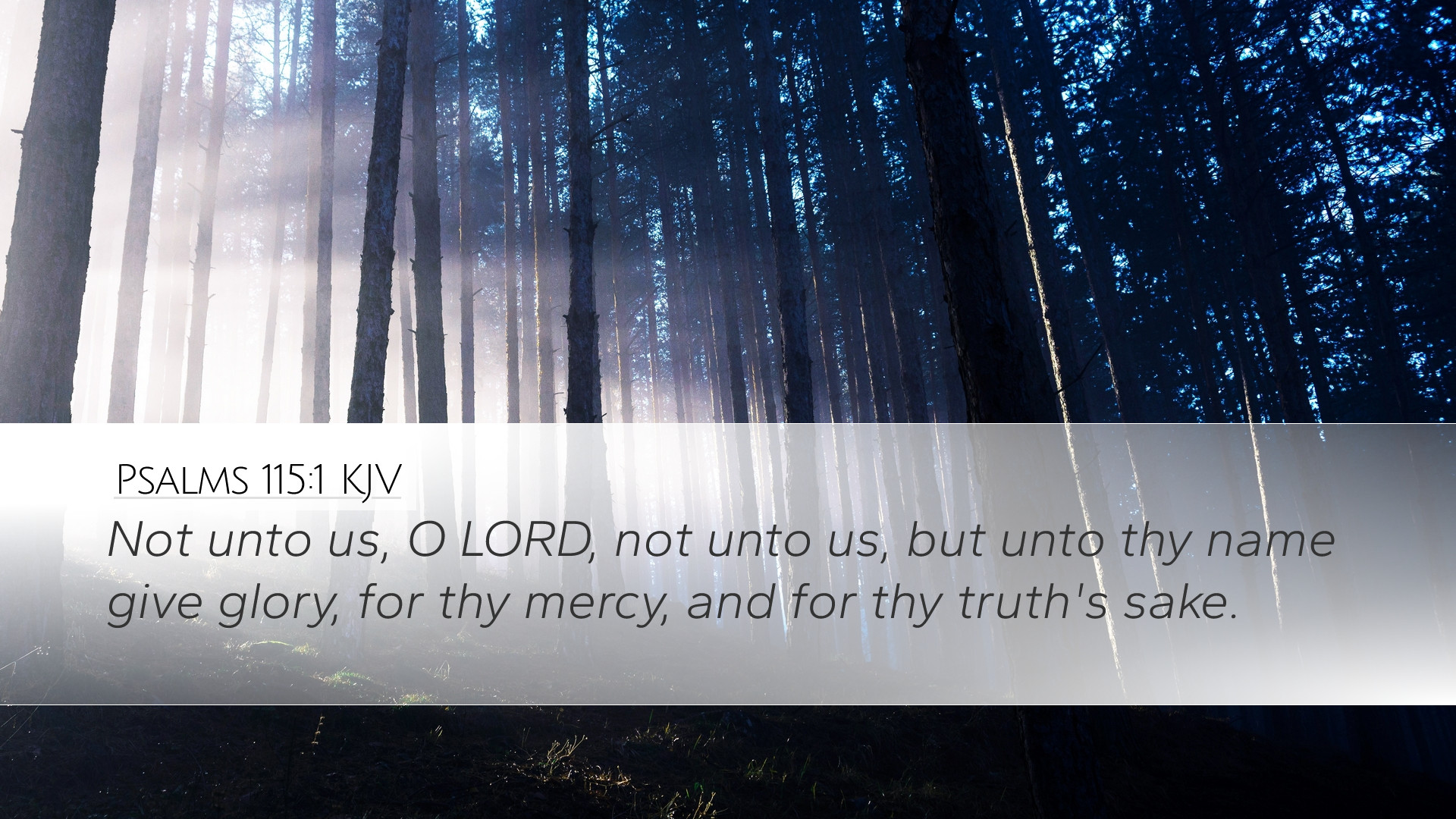Commentary on Psalms 115:1
Psalms 115:1 (KJV): "Not unto us, O Lord, not unto us, but unto thy name give glory, for thy mercy, and for thy truth's sake."
Introduction
The opening verse of Psalm 115 presents a heartfelt declaration of humility and a profound understanding of God’s glory. This verse stands as a foundational principle in the worship of God, emphasizing that all glory and honor belong to Him alone. It serves as a reminder to believers to focus not on themselves but on the character and nature of God, particularly His mercy and truth.
Thematic Elements
- Divine Sovereignty: The psalmist underscores the supremacy of God over human actions and achievements.
- Human Humility: There is a recognition that any honor or praise directed towards humanity is misplaced; thus, it should be redirected towards God.
- The Nature of God: The psalm emphasizes God's mercy (chesed) and truth (emet), showcasing His character as a loving, faithful, and righteous being.
Commentary from Matthew Henry
Matthew Henry emphasizes the attitude of self-denial in worship. He interprets the phrase "Not unto us" as a clear rejection of self-glory and a plea for God's glory to be recognized. According to Henry, the psalmist is keenly aware that blessings and successes do not originate from human effort but are bestowed graciously by God’s will and purpose.
Henry elaborates that God's name must be glorified for two reasons: His mercy and His truth. The mercy of God, he notes, reflects His covenantal love that endures, while His truth demonstrates His reliability and faithfulness. This dual emphasis on mercy and truth encapsulates the essence of God's character and His covenant with His people.
Insights from Albert Barnes
Albert Barnes provides a theological reflection, emphasizing that the glory of God should be the central focus of worship. Barnes points out that the phrase "Not unto us" is not merely an expression of humility but a profound statement about the purpose of creation. Humans are created for the glory of God, and thus all efforts should culminate in honoring Him.
He further explicates that the psalmist's insistence that glory be directed to God's name is an acknowledgment of God's sovereign role in the history of Israel. This understanding fosters a community that recognizes its dependence on divinely sourced grace and truth, encouraging believers to seek God’s honor above their own personal accolades.
Reflections by Adam Clarke
Adam Clarke offers a detailed analysis of the terms ‘mercy’ and ‘truth,’ suggesting that mercy refers to the kindness and compassion of God, while truth relates to the certainty and reliability of God's promises. He suggests that these attributes are not independent but operate together, demonstrating that God's actions toward His people are always rooted in His unwavering commitment to His word.
Clarke emphasizes the importance of public worship and communal acknowledgment of God’s glory, indicating that such recognition serves to strengthen the faith of individuals and the community as a whole. He advocates that the realization of God's mercy and truth should lead the faithful to praise Him consistently and fervently.
Application for Pastors and Scholars
This verse serves as a vital reminder for pastors, theologians, and believers. It offers a framework for understanding the purpose of worship, redirecting the focus away from human achievements to the divine attributes of God. The calls for humility in ministry, recognizing that all success and triumphs in life should point back to God’s glory, must resonate deeply within a church's mission and vision.
Moreover, the interrelation between God’s mercy and truth challenges scholars to develop a holistic view of God’s character. In theological discussions, acknowledging that God's actions are consistent with His nature allows for a better understanding of scripture and divine interaction with humanity. It poses a challenge to believers to reflect this understanding in personal and communal worship settings.
Conclusion
In summary, Psalms 115:1 encapsulates a vital theological principle: the glory of God is paramount in the lives of believers. As articulated through the insights of Matthew Henry, Albert Barnes, and Adam Clarke, this verse is a profound reminder that all glory should rightly belong to God, who is merciful and truthful. Pastors, students, and theologians alike are encouraged to internalize this principle, allowing it to transform their perspectives on worship, ministry, and the understanding of God’s ongoing work in the world.


